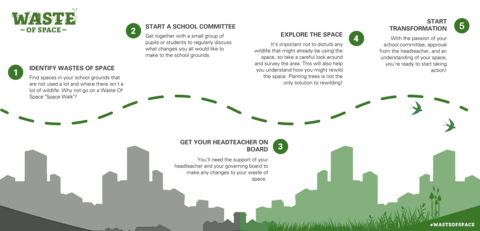Find out below how your school can get involved with Waste of Space.
Being in nature plays a big role in children's wellbeing, motivation, and confidence. We believe everyone should have the opportunity to experience the joy of wildlife in daily life and we’re calling on schools to help us connect more children with nature. By rethinking the ways we use school grounds and teach children about the natural world, we can highlight all of its wonders and build a sense of empathy for it.
We're looking for spaces that are unused, unloved, and devoid of wildlife that you think are a #WasteOfSpace and need to be put to better use. Our schools make good use of their outdoor spaces, used for sports grounds and for children to play in during their break times. However, there may be areas that are concreted over for no particular reason, or areas of land that are not used very much.
Take a walk around your school grounds with your students or pupils and plot your wastes of space on our interactive map. Check out our resources to see how this might fit in your lesson plan!
Plot a waste of space on the map
Layers
What next?
Scroll down to find out below how your school can get involved with Waste of Space. At each stage of the program, there are different resources to download.

Take action
Step one: Form a School Committee
A Schools Committee is a small group of selected pupils who regularly get together to discuss what changes they’d like to make to the school grounds, sustainability credentials of the school, or outdoor learning opportunities. Form a school committee with your class as part of a lesson or as an after school club to discuss how you could transform your Wastes of Space. The selected pupils can come from existing groups such as an eco-group, school council or a particular class, or children can nominate themselves to join the committee. You can download our Primary School Committee or Secondary School Committee Resources in the links provided.
Step two: Explore your Wastes of Space
Teach your pupils and students how to conduct citizen science surveys by exploring your Wastes of Space. We have various wildlife surveys for you to use. By exploring your Waste of Space, you can determine how much wildlife the space currently supports and find out how you might transform the space. Not all Wastes of Space will necessarily be bad spaces for wildlife and not all spaces will be suitable for the types of transformation you have in mind.
Step three: #RewildThis #WasteOfSpace
If you've completed your citizen science surveys and gotten permissions from the landowner, you're ready to take action. We have several resources to help you get underway.
FAQs
What do we mean by a Waste of Space?
Any area, no matter how small, will contribute to a Nature Recovery Network, and help rewild where we live. We are asking schools to identify small pockets of land on their grounds which could be improved rather than existing green space. Examples of this include excess paved over areas, excess grass areas, or pavement verges.
What happens after we've mapped our wasted spaces?
The mapped wasted spaces will be used by the Trust to support our campaigns for the need of a wilder future. It would be amazing to transform the many wasted spaces that have been identified, but with limited resources at the Trust, we rely on the very generous support of the public (you all) who have helped make space for nature in so many parts of their towns and cities already.
We recognise that not all of the spaces mapped will be able to be adopted for various reasons. Your school leaders might not be able to set aside an area for wildlife or the area itself might not be such a waste of space as it first appears.
Once the spaces have been identified you're encouraged to create a school committee who will decide on what to do with the wasted spaces and work with your head teach and board of governors to bring about change. Everyone who takes part will become part of Team Wilder, 1000s of people across the two counties who are taking action for wildlife.
Find out more about Team Wilder: hiwwt.org.uk/team-wilder
Who will be responsible for the ongoing management of these spaces?
As part of Team Wilder, our Wilder Schools programme will provide ongoing support, ensuring that schools have the skills and commitment to look after these spaces.
Get in touch
If you're at any point unsure, get in touch with us at wilder@hiwwt.org.uk
